Discover bold and thought-provoking Homewrecker Quotes that reveal raw emotions, untold stories, and hidden truths. Homewrecker refers to someone who is involved in destroying a romantic relationship, often causing significant emotional turmoil for everyone involved.
The concept of a “homewrecker” has long been part of popular culture and can carry many interpretations-sometimes a villain, sometimes a misguided participant in complex circumstances.
This list of quotes explores the meaning of being a homewrecker, the emotions associated with infidelity, and the complexities of love, loyalty, and betrayal, paired with insightful commentary to reflect on the deeper implications.
A homewrecker is often seen as the person who comes between a relationship or family, but the real story is never that simple. Whether you see them as a villain, a temptation, or just a symptom of a broken relationship, the truth is—no one can wreck a home that wasn’t already cracking.
From savage comebacks to betrayal reflections, these quotes capture the fire, the drama, and the hard-hitting truth behind stolen love and shattered trust. Ready to dive in? 🔥💔
Homewrecker Captions

- “I don’t steal, I just take what wasn’t truly yours. 💅”
- “If your relationship was solid, I wouldn’t be a problem. 😉”
- “Blame your man, not me. I owe you nothing. 🤷♀️”
- “He left because he wanted to, not because I made him. 🤭”
- “I don’t chase, I attract. Even if he’s taken. 💋”
- “A king who respects his queen wouldn’t be in my DMs. 📩”
- “Your trust issues aren’t my problem, babe. 😘”
- “If I can take him, he was never really yours. 🤷♀️”
- “I’m not the villain; I’m just the plot twist. 🎭”
- “A real man can’t be stolen, but yours wasn’t real, was he? 😏”
- “I’m not wrecking anything—just revealing the cracks. 🔥”
- “Keep blaming me while he’s still texting. 🧐”
- “Your problem isn’t me. It’s him choosing me. 🖤”
- “Call me what you want; he still picked me. 🥀”
- “If he loved you, would I even be here? 🤔”
Savage Homewrecker Quotes
- “If he’s cheating with me, he’s cheating on me too. I just don’t care. 💋”
- “Don’t call me a homewrecker when your house was already in ruins. 🏚️”
- “You played the wife, I played the upgrade. 🎭”
- “If he cheats, it’s not my fault—he just found something better. 💅”
- “I didn’t break your home; I just walked through the open door. 🚪”
- “The real problem is your man’s lack of loyalty, not my existence. 🤷♀️”
- “I’m not a thief; I just accept what’s freely given. 🎁”
- “Your love story was a fairy tale. I’m just the plot twist. 📖”
- “Blame the game, not the player. 😈”
- “You’re mad at me? Be mad at him for chasing me. 😘”
- “I only take applications from unhappy husbands. 📩”
- “Somebody had to show him what he was missing. 💋”
- “Don’t hate me because I did what you couldn’t. 😏”
- “Men aren’t stolen; they leave. Ask him why. 🤭”
- “If you were doing your job, I wouldn’t have mine. 🖤”
Betrayal Homewrecker Quotes

- “Betrayal doesn’t come from strangers—it comes from those closest to you. 🥀”
- “Loyalty is just a word until someone better comes along. 🤷♀️”
- “You trusted him, but he trusted me more. 💔”
- “Nothing hurts more than watching someone replace you so easily. 💔”
- “A homewrecker isn’t born; she’s created by a man’s lies. 🔥”
- “Trust is fragile, and so was your relationship. 😏”
- “He didn’t cheat because of me; he cheated because of himself. 🖤”
- “A loyal man wouldn’t have entertained me. Let that sink in. 😶”
- “When love is real, temptation doesn’t exist. 💭”
- “The moment he looked at me like that, he betrayed you. 😈”
- “He told you he loved you, but he showed me. 🎭”
- “You gave him your heart, and he gave me his attention. 🥀”
- “Loyalty isn’t tested in good times but in temptation. 🤷♀️”
- “Your love wasn’t enough for him—don’t blame me for proving it. 😏”
- “Some betrayals come with apologies; others come with new beginnings. 💋”
Family Homewrecker Quotes
- “A broken home starts with a broken heart. 💔”
- “A woman who destroys a family will never know peace. 🔥”
- “Homewreckers don’t win; they just rearrange the damage. 🏚️”
- “The one who breaks a family will never build a happy one. ⚠️”
- “The pain of a broken home is heavier than the thrill of an affair. 💔”
- “Family is built on trust, but some people thrive on betrayal. 😏”
- “Every homewrecker creates fatherless children and shattered dreams. 💭”
- “What goes around comes around—karma has a long memory. 🔄”
- “You may take the man, but you can’t take away the damage. 💀”
- “The scars of a broken family last longer than the thrill of an affair. 🖤”
- “No home built on destruction will ever stand strong. 🏠”
- “It’s easy to wreck a family but impossible to fix the damage. 💔”
- “The woman who steals a man steals a lifetime of pain. ⚠️”
- “You may win the man, but you’ll never replace the family. 😶”
- “A home built on betrayal will never be at peace. 🏚️”
The Role of a Homewrecker Understanding the Consequences
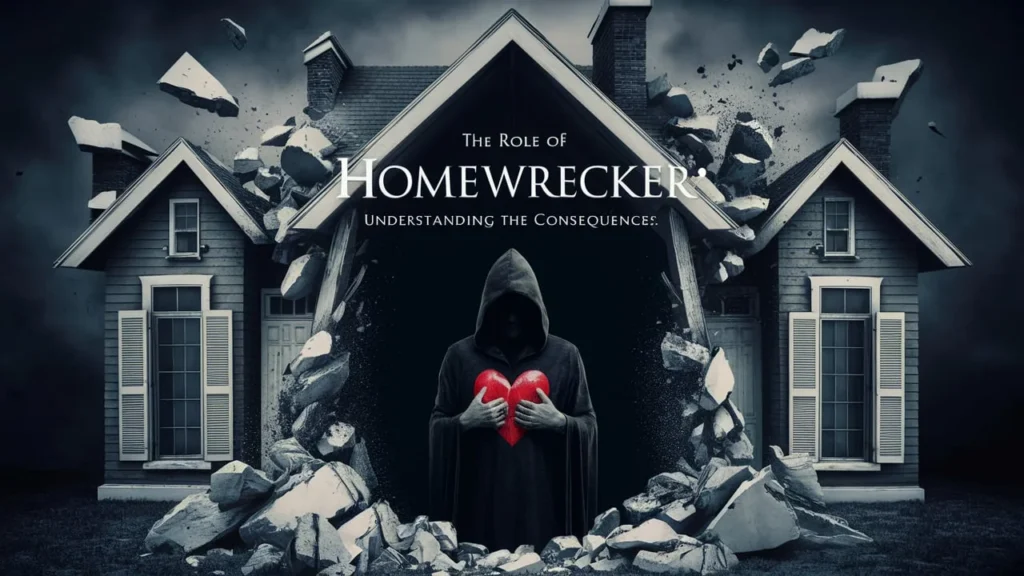
- “A homewrecker doesn’t just destroy relationships shatter trust and break hearts.”
- “The true cost of being a homewrecker isn’t just the wreckage-it’s the regret that follows.”
- “A homewrecker might tear down a house, but it can never rebuild the trust that was once there.”
- “In the wake of a homewrecker, the foundation of a relationship crumbles, but the emotional scars last longer.”
- “Being a homewrecker may seem thrilling at the moment, but it leaves behind a trail of broken dreams.”
- “Homewrecking is the art of stealing not just a partner, but a piece of someone’s future.”
- “The role of a homewrecker is never glamorous-it’s a story of betrayal, deceit, and heartache.”
- “A homewrecker doesn’t build something new and destroy what was once a foundation of trust.”
- “Infidelity doesn’t just break one relationship fractures the entire concept of loyalty.”
- “When someone plays the part of the homewrecker, they’re not just ruining another’s life-they’re ruining their chance at real love.”
- “A homewrecker is often the face of desperation, seeking love at the expense of others.”
- “What the homewrecker doesn’t realize is that the destruction they cause often starts with themselves.”
- “Being a homewrecker is about selfishness-it’s about taking what you want without understanding the cost.”
- “When you break someone’s home, you don’t just change their life change yours too, forever.”
- “The fallout from being a homewrecker isn’t always immediate, but it is always inevitable.”
- “Infidelity doesn’t just break hearts-it poisons relationships and leaves a toxic trail behind.”
- “Homewreckers think they’re winning, but in the end, no one truly wins when love is used as a weapon.”
- “The devastation of being a homewrecker is measured not just in loss, but in guilt and remorse.”
- “A homewrecker may walk away unscathed, but the damage they’ve caused lingers in the hearts of others.”
- “What starts as a thrill often ends as a burden-the true weight of being a homewrecker is borne by the soul.”
The Motives Behind Homewrecking Exploring the Psychology
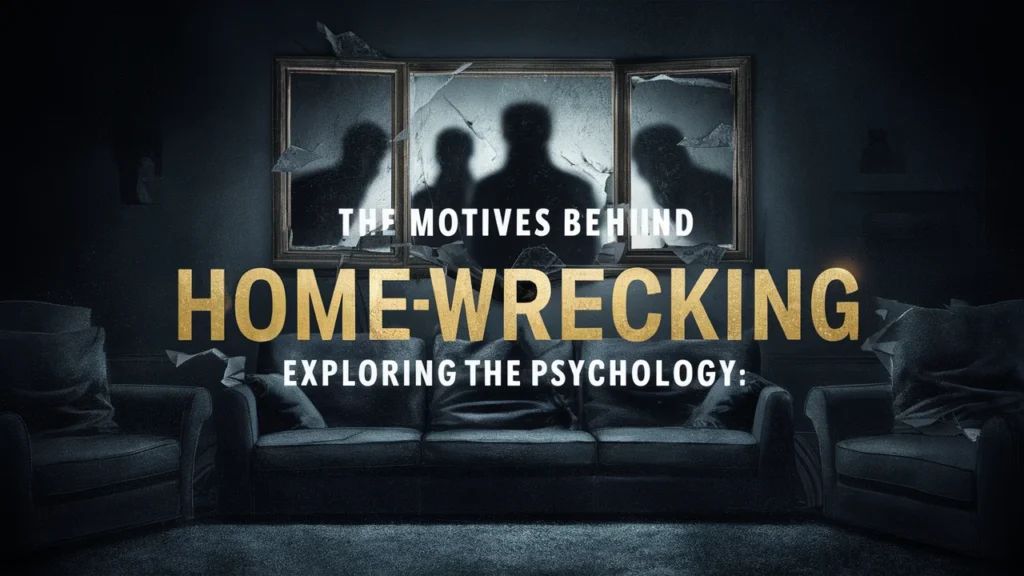
- “A homewrecker is often driven by insecurity-trying to fill a void that can never truly be satisfied.”
- “People who wreck homes often aren’t seeking love- they’re seeking validation, even at the expense of others.”
- “The heart of a homewrecker is often broken in its right just don’t know how to heal it properly.”
- “In many cases, a homewrecker doesn’t care for the partner they steal-they care for the thrill of the chase.”
- “Homewrecking can sometimes be born out of emotional hunger, but it rarely satisfies the hunger within.”
- “The motivation behind homewrecking often lies in self-doubt and the need to prove one’s worth through someone else.”
- “Some homewreckers think they are the solution to a broken relationship, not realizing they are part of the problem.”
- “In some cases, a homewrecker sees themselves as a savior-but they’re just the agent of destruction.”
- “The true tragedy of a homewrecker’s motives is that they never realize the pain they inflict until it’s too late.”
- “People who wreck homes are often experts at manipulation, convincing themselves that they’re not doing anything wrong.”
- “Homewreckers don’t always start with malicious intent; many begin as lost souls trying to find their way.”
- “The thrill of winning someone’s heart is often short-lived for a homewrecker-what they gain at the moment is nothing compared to the loss they’ll feel later.”
- “Sometimes, homewrecking comes from a place of emotional weakness, where someone tries to fill a need with the wrong person.”
- “A homewrecker is someone who thrives on the chaos of others, hoping the drama fills their emptiness.”
- “Behind every homewrecker is often someone who doesn’t know how to love themselves, much less others.”
- “Sometimes, a homewrecker’s motive is nothing more than a desire for attention and affection-no matter the cost.”
- “The psychology of a homewrecker often involves a distorted sense of ownership over someone else’s partner.”
- “Homewreckers often mistake desire for love, believing that taking someone’s partner means they are desired.”
- “The pursuit of someone else’s love often reflects deep-seated fears and insecurities within the homewrecker.”
- “A homewrecker’s true need is not the partner they’re after, but the validation they hope to find by taking them.”
If do you want to study english grammer so visit this site: Grammerheist.com
The Victims of Homewrecking The Pain of Betrayal
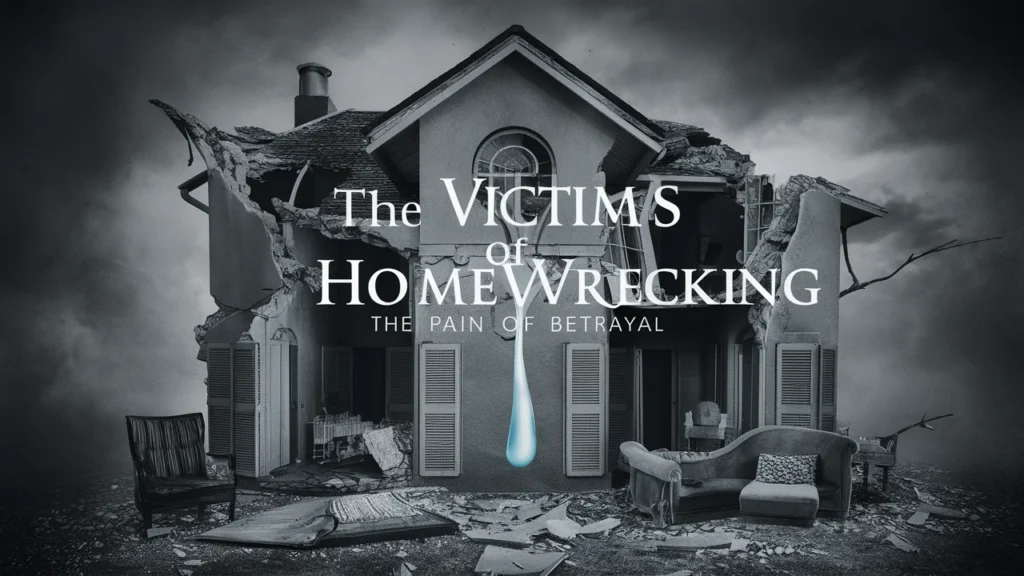
- “The hardest part about being betrayed by a homewrecker is not just losing a partner’s losing the trust in yourself.”
- “Homewrecking cuts deeper than just the betrayal leaves a scar on the soul.”
- “When someone enters your life as a homewrecker, they don’t just destroy your relationship-they fracture your belief in love.”
- “The real devastation of being betrayed is knowing that someone you loved thought so little of you.”
- “Homewrecking hurts not only because of the betrayal but because of the emotional manipulation that often accompanies it.”
- “The most painful part of being a victim of a homewrecker is that you’re left to pick up the pieces alone.”
- “Homewreckers don’t just steal your partner steal the version of yourself you once loved.”
- “Being betrayed by a homewrecker often leaves you questioning your worth and the authenticity of your past love.”
- “The aftermath of betrayal by a homewrecker isn’t just about losing someone- it’s about losing your sense of security.”
- “When a homewrecker steps into your life, they don’t just break your heart and destroy the foundation of your identity.”
- “The sting of being betrayed by a homewrecker lingers in the memories of love that were once real.”
- “Homewrecking causes not just heartbreak, but the kind of emotional trauma that can take years to heal.”
- “Being the victim of a homewrecker means rebuilding your entire worldview, especially around trust.”
- “The victim of homewrecking is often left with a feeling of abandonment-betrayed not only by their partner but by the idea of love itself.”
- “Homewreckers don’t just break up relationships break the emotional foundation of families.”
- “When trust is shattered by a homewrecker, the pieces of the past become difficult to reclaim.”
- “The pain of betrayal by a homewrecker is often compounded by the realization that you were never fully seen or valued.”
- “The betrayal caused by a homewrecker leaves you questioning everything you once believed about loyalty.”
- “Homewrecking often takes more than just a partner and strips away your faith in others and yourself.”
- “The victim of homewrecking is not just someone left alone- it’s someone left with deep emotional scars to heal.”
The Ripple Effect The Impact of Homewrecking on Families and Friendships
- “A homewrecker’s actions ripple through families and friendships, leaving chaos in their wake.”
- “Homewrecking doesn’t just destroy a couple-it fractures families, friendships, and communities.”
- “The aftermath of homewrecking isn’t just felt by the betrayed partner affects everyone who cared about them.”
- “When a homewrecker destroys a relationship, they tear apart more than just two lives and break the bonds of family and friendship.”
- “Homewrecking spreads like wildfire, leaving everyone in its path burnt and wounded.”
- “A homewrecker doesn’t just hurt one person bring pain to everyone who’s invested in that relationship.”
- “Families are torn apart by homewrecking, often leaving children confused and heartbroken.”
- “The ripples of betrayal caused by a homewrecker can be felt for generations, as the pain gets passed down.”
- “Homewrecking doesn’t just destroy love destroys the sense of stability and trust that families rely on.”
- “The friends and families of those affected by homewrecking often bear the emotional weight of betrayal.”
- “The emotional destruction caused by homewrecking can create long-lasting rifts between families and friends.”
- “The impact of a homewrecker extends far beyond the betrayed partner and spreads throughout the social fabric of everyone involved.”
- “A homewrecker’s actions don’t just harm a couple-they create distrust within entire social circles.”
- “Homewrecking creates division, and those who were once allies often find themselves in opposing corners.”
- “When a homewrecker enters the picture, they disrupt not just romantic relationships, but entire networks of support.”
- “The emotional wounds caused by homewrecking can make it difficult for families and friends to find closure.”
- “Betrayal by a homewrecker leaves families fractured, as loved ones take sides and lose trust in each other.”
- “The damage done by a homewrecker extends far beyond the romantic relationship seeps into all aspects of life.”
- “Homewreckers don’t just break hearts-they break the foundation of social and familial harmony.”
- “When someone becomes a homewrecker, they cause an emotional earthquake that can shake families to their core.”
The Aftermath Dealing with the Emotional Fallout of Homewrecking
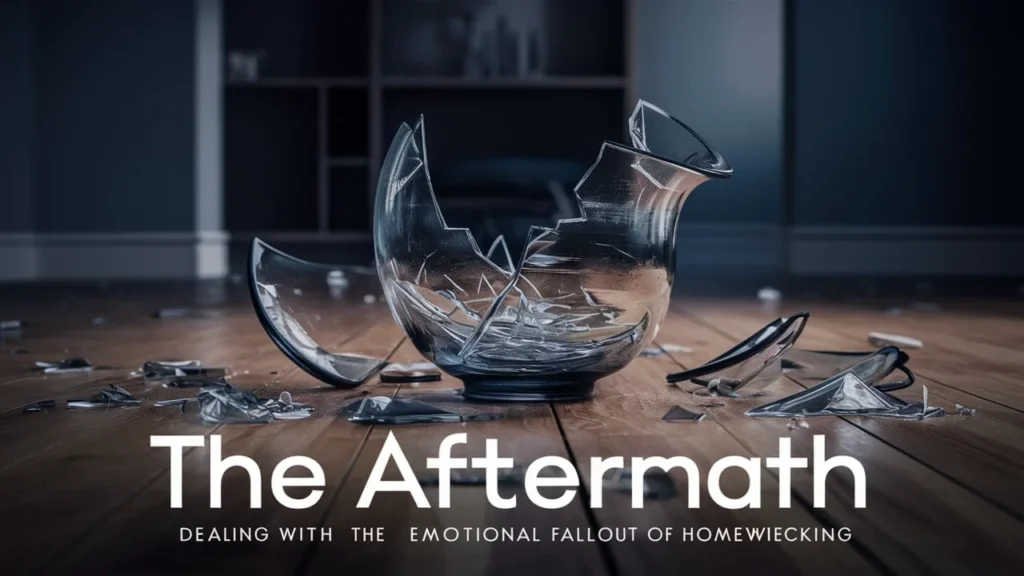
- “The emotional fallout from being a victim of a homewrecker is like navigating a minefield step is uncertain.”
- “When someone wrecks your home, you don’t just lose a partner-you lose a sense of security in everything you thought you knew.”
- “The pain of being betrayed often lingers long after the homewrecker is gone.”
- “Healing from the emotional wreckage of betrayal takes more than time-it takes deep introspection and self-compassion.”
- “The real work after a homewrecking incident is rebuilding the trust you once had in yourself.”
- “Victims of homewrecking often feel like they are forced to rebuild their lives from scratch, with shattered pieces of their past.”
- “The emotional scars left by a homewrecker can make even the simplest of interactions feel like a challenge.”
- “Betrayal at this level doesn’t just affect love-it erodes the emotional foundation of who you are.”
- “It’s often not the person who wrecked the home who suffers the most, but the ones left behind to pick up the pieces.”
- “Emotional healing after homewrecking is not about forgetting-it’s about learning how to trust again.”
- “The path to recovery from a homewrecking betrayal is long, but it begins with forgiving yourself first.”
- “Living through the aftermath of a homewrecker’s actions can feel like trying to rebuild a broken mirror-once shattered, it’s never the same.”
- “Even after the emotional dust settles, the wreckage left behind in a relationship can leave a mark on your soul.”
- “The hardest part of the emotional aftermath is feeling like you were never fully seen or valued by the person who betrayed you.”
- “Dealing with a homewrecker’s impact often feels like you’re left with fragments of your former self, unsure how to put them back together.”
- “After being betrayed by a homewrecker, it’s not just your heart that hurts-it’s your sense of self-worth and confidence.”
- “The emotional healing from a homewrecker’s destruction requires the courage to rebuild without letting the scars define you.”
- “Healing from betrayal requires emotional space, time, and the support of those who truly understand your pain.”
- “The emotional pain of homewrecking never fully goes away, but it softens with self-love and inner strength.”
- “Recovering from the emotional fallout of being betrayed by a homewrecker requires compassion, but also firm boundaries to protect your peace.”
Self-Reflection Why People Become Homewreckers
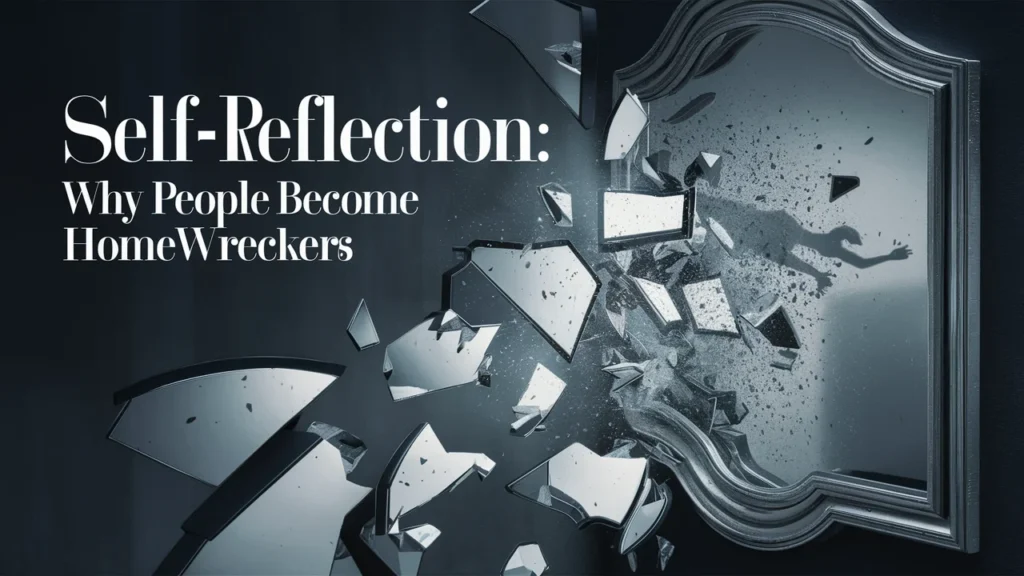
- “Homewreckers are often people running from their pain, trying to fill a void with someone else’s love.”
- “The motivation behind homewrecking often stems from deep insecurities and the desperate need for validation.”
- “Some people become homewreckers not out of malice, but because they are deeply broken inside.”
- “The allure of being the ‘other person’ can sometimes mask an individual’s inability to confront their emotional wounds.”
- “A homewrecker often seeks love in all the wrong places because they don’t know how to find it within themselves.”
- “People become homewreckers because they fail to realize that real love begins with self-love.”
- “The need to be desired or wanted can drive people to make decisions that will haunt them in the long run.”
- “A homewrecker might believe that they can fix someone else’s brokenness without realizing their own is just as fractured.”
- “The act of homewrecking is often a misguided attempt at creating something out of nothing-an illusion of love.”
- “People who engage in homewrecking may feel empowered at the moment, but they end up feeling emptier than before.”
- “Homewreckers may think they are solving their loneliness, but they are only deepening their emotional isolation.”
- “The fear of being unlovable is often what drives someone to become a homewrecker.”
- “Sometimes, the need to feel wanted blinds a person to the reality of the harm they’re causing.”
- “People become homewreckers because they’ve never learned that true love is based on mutual respect, not conquest.”
- “Self-doubt and the need to prove one’s worth often fuel the drive to become a homewrecker.”
- “A person who engages in homewrecking often confuses desire with love, mistaking one for the other.”
- “Some homewreckers act out of jealousy, unable to accept the happiness of others and unwilling to confront their flaws.”
- “The emotional emptiness that drives homewrecking can only be filled by self-discovery and healing, not by taking someone else’s partner.”
- “The act of homewrecking is not just about the other person’s about the homewrecker’s inability to address their issues.”
- “To avoid becoming a homewrecker, one must first recognize and heal their emotional wounds before seeking validation from others.”
The Impact of Homewrecking on Children and Families
- “When a home is wrecked, children often bear the emotional weight of their parents’ broken promises.”
- “Homewrecking leaves deep emotional scars on children, who may struggle to understand the sudden changes in their family dynamics.”
- “For children, the fallout from homewrecking is more than just a loss-it’s an emotional betrayal that changes their view of love and trust.”
- “Homewrecking doesn’t just hurt the parents-it can alter a child’s sense of stability and security for years.”
- “Children raised in homes affected by infidelity often struggle with attachment issues and fear of abandonment.”
- “The emotional pain of being a child in a home wrecked by infidelity can lead to confusion and long-term trust issues.”
- “When parents allow a homewrecker into their lives, children often bear the burden of witnessing their trust shattered.”
- “The impact of a homewrecker’s actions doesn’t fade for children stays with them, influencing their relationships as they grow.”
- “Homewrecking isn’t just an adult issue-it’s a family issue that affects the emotional well-being of everyone, especially the children.”
- “Children exposed to homewrecking are often forced to navigate complex emotions they’re not equipped to understand.”
- “The damage caused by homewrecking can create generational trauma, affecting how children perceive love and relationships.”
- “Children in a home wrecked by infidelity may have trouble understanding the concept of loyalty and trust as they grow.”
- “When homewrecking occurs, it creates confusion for children, who often feel torn between their parents and the new reality.”
- “Homewrecking often leads to a fractured family dynamic, leaving children to face an emotional fallout they didn’t ask for.”
- “Children witnessing the effects of homewrecking may develop unhealthy coping mechanisms to deal with their pain.”
- “For children, the emotional scars of a homewrecking incident can remain for a lifetime, shaping their future relationships.”
- “The real victims of homewrecking are often the children who don’t understand the adult world of betrayal and deceit.”
- “When a home is wrecked, it’s not just the relationship between the parents that suffers- it’s the relationships between siblings and extended family.”
- “For children, homewrecking often leaves behind confusion, resentment, and deep emotional wounds.”
- “The emotional cost of homewrecking on children is incalculable and disrupts their sense of safety, trust, and love.”
Moving On to How to Heal from the Trauma of Homewrecking
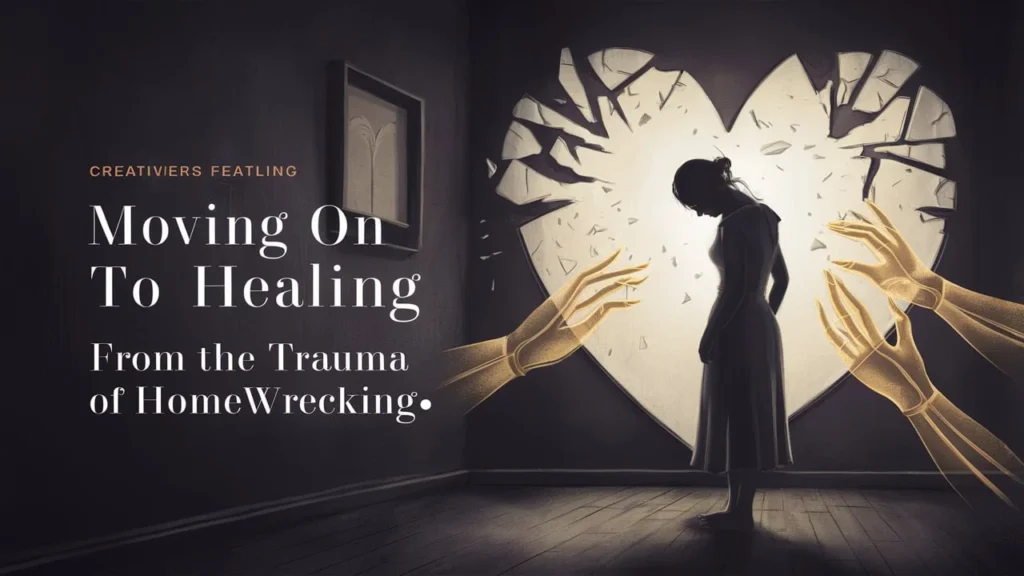
- “Healing from the trauma of homewrecking begins with accepting that it’s okay to grieve the loss of what could have been.”
- “Moving on from a homewrecking betrayal requires you to rebuild your self-worth, one step at a time.”
- “The path to healing after homewrecking is a journey it one day at a time, and be gentle with yourself.”
- “Forgiveness is part of healing, but it starts with forgiving yourself for letting someone into your life who caused harm.”
- “To heal from homewrecking, you need to let go of the past and embrace the possibility of a future that is free from betrayal.”
- “Healing from the trauma of homewrecking is a matter of rebuilding trust in yourself and others, no matter how difficult it seems.”
- “The first step to healing is to stop blaming yourself for something you didn’t cause are not responsible for someone else’s actions.”
- “Rebuilding after homewrecking requires finding strength within yourself and reclaiming your power to move forward.”
- “Healing from the emotional pain of homewrecking involves not just surviving, but thriving after betrayal.”
- “To heal, you must allow yourself the space to feel pain then can you begin the process of rebuilding.”
- “Moving on from the devastation of homewrecking involves setting healthy boundaries and knowing when to let go.”
- “Healing isn’t a straight path; it’s a winding road with setbacks, but each step forward is progress.”
- “The healing process involves acknowledging the pain and using it as a tool to rebuild a stronger sense of self.”
- “Moving on from betrayal requires learning to love and trust yourself again, and that takes time.”
- “Healing from homewrecking doesn’t mean forgetting-it means making peace with the past and focusing on a brighter future.”
- “To heal from the wounds caused by a homewrecker, you need to reclaim your independence and strength.”
- “True healing comes when you stop looking back and start focusing on what’s ahead happiness is still possible.”
- “After homewrecking, healing requires opening yourself to new possibilities, understanding that not all relationships are defined by betrayal.”
- “Moving on from a homewrecker’s betrayal is about learning to trust again, but first, you must trust yourself.”
- “Healing from the trauma of homewrecking takes time, but with support and self-compassion, it’s possible to emerge stronger than before.”
Learning from the Past How to Avoid Becoming a Homewrecker
- “To avoid becoming a homewrecker, you must first learn the value of respecting other people’s relationships.”
- “True growth comes from understanding that love should be built on honesty and integrity, not deceit.”
- “The path to avoiding homewrecking begins with understanding the importance of healthy boundaries in relationships.”
- “Avoiding becoming a homewrecker starts with knowing that fulfilling your emotional needs doesn’t come at the expense of others.”
- “The key to not becoming a homewrecker is respecting the sanctity of others’ relationships and healing your emotional wounds.”
- “To prevent homewrecking, you must first learn to cultivate self-love and self-worth before seeking it from others.”
- “Becoming a better person in relationships starts with recognizing your own emotional needs and working on them with maturity.”
- “A good relationship is one where both people are whole and healed, not seeking validation from someone else’s partner.”
- “Avoiding the temptation to become a homewrecker involves knowing your emotional triggers and addressing them in healthy ways.”
- “The best way to avoid being a homewrecker is to build relationships based on trust and respect, not on the ruins of others.”
- “When you understand that healthy relationships are based on mutual respect, the urge to become a homewrecker fades away.”
- “Avoiding the act of homewrecking requires building your emotional resilience and knowing that you don’t need to take someone else’s happiness to find your own.”
- “To avoid becoming a homewrecker, you must learn to heal your wounds before seeking love from others.”
- “Becoming aware of your own emotions and insecurities is the first step in avoiding the destructive path of homewrecking.”
- “Avoiding homewrecking is about recognizing the pain it causes and choosing a path that doesn’t involve betraying others.”
- “The best way to avoid causing harm in a relationship is to communicate openly and honestly, making sure everyone’s feelings are respected.”
- “To prevent homewrecking, always remember that true love involves loyalty and honesty, not manipulation and deceit.”
- “To not become a homewrecker, you must take responsibility for your own emotional needs and avoid relying on someone else’s partner.”
- “Avoiding becoming a homewrecker starts with understanding the damage it causes and choosing a path of healing and respect.”
- “To avoid the path of homewrecking, you must develop a deep respect for the emotional integrity of others and build your emotional maturity.”
The Cycle of Homewrecking Breaking Free from Destructive Patterns
- “Breaking the cycle of homewrecking requires recognizing the patterns of behavior that lead to destruction in relationships.”
- “To break free from the cycle of homewrecking, you must first understand the reasons behind your actions and confront your emotional wounds.”
- “The cycle of homewrecking continues as long as people fail to recognize the damage they’re causing and choose to heal rather than repeat destructive behavior.”
- “Breaking the cycle of homewrecking starts with choosing to live with integrity, even when tempted by the allure of forbidden love.”
- “To break free from the pattern of homewrecking, you must learn to seek love in healthy ways that don’t involve betrayal.”
- “Breaking free from homewrecking requires acknowledging the past, but not allowing it to define your future choices.”
- “The cycle of homewrecking can only be broken when you commit to emotional healing and stop seeking validation from others.”
- “To break the cycle of homewrecking, you must choose respect over desire and recognize the long-term harm caused by betrayal.”
- “Breaking free from the destructive cycle of homewrecking means understanding that true love is based on honesty, not conquest.”
- “The first step in breaking the cycle of homewrecking is to stop ignoring the emotional damage it causes and begin the healing process.”
- “Breaking free from this cycle requires recognizing your emotional triggers and learning to deal with them in healthier ways.”
- “To escape the cycle of homewrecking, you must choose self-respect over self-sabotage and emotional dependency.”
- “The cycle of homewrecking can be ended when you learn to build healthier relationships with both yourself and others.”
- “Breaking free from the pattern of homewrecking requires recognizing that true happiness doesn’t come at the cost of someone else’s peace.”
- “To end the cycle of homewrecking, you must focus on emotional growth and self-awareness to prevent repeating destructive behaviors.”
- “Breaking free from homewrecking begins with learning to let go of the past and not letting it dictate your future relationships.”
- “The key to breaking the cycle of homewrecking is to create new patterns of behavior that are rooted in trust, respect, and self-love.”
- “Breaking free from the destructive cycle of homewrecking requires making choices that prioritize emotional health and integrity.”
- “The cycle of homewrecking ends when you decide to choose healthier, more respectful paths in your relationships.”
- “Breaking the cycle of homewrecking is a decision to stop living in self-deception and start living with emotional clarity and responsibility.”
Final Thought
Homewrecking is never a simple act-it’s a complex emotional storm that affects more than just the couple involved. Whether driven by insecurity, selfishness, or misunderstanding, its impact is far-reaching. Victims suffer not only from betrayal but also from the dissolution of trust and identity. Ultimately, the wreckage caused by homewrecking can take years to heal, and its scars often last a lifetime. The lesson here is clear: love should never come at the cost of someone else’s happiness. True happiness and fulfillment come from creating, not destroying.

Bella Marie is a creative writer and the imaginative mind behind Quotes Nexus. With a passion for expressing the beauty of life through words, Bella crafts quotes that inspire and uplift. Her writing captures the essence of love, friendship, and personal growth, making her a beloved voice among readers who seek motivation and connection.













